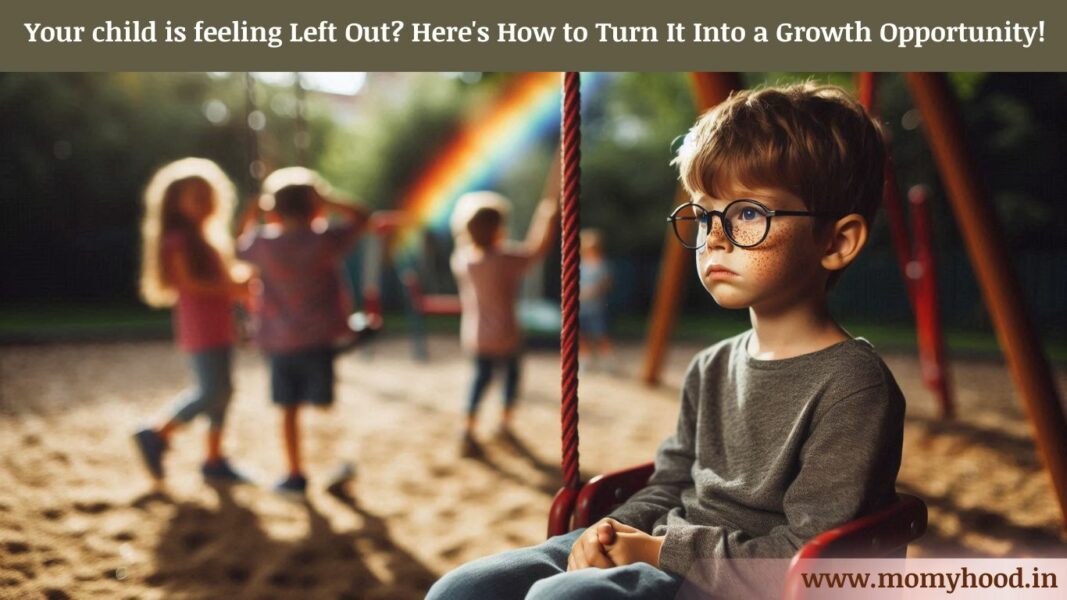As a mom of two, I’ve been through it all. Watching your child being left out by friends can be one of the hardest things to experience. My son, Aarav has been excluded from playgroups and activities more times than I can count, and each time it happens, it tugs at my heart.
But over time, I’ve learned that this is a normal part of growing up. It’s important to take a step back and see the bigger picture—being left out isn’t always a bad thing. In fact, it can be an opportunity for growth, for both our children and ourselves as parents.
In this article, I’ll share my own journey with Aarav, what I’ve learned about handling these situations, and some practical tips that helped me manage these moments—without feeling defeated.
The First Time I Saw Aarav Get Left Out
I still remember the first time Aarav came home in tears. He was only 4, and he had been left out by his group of friends at the playground. They decided to play a game he wasn’t interested in, and despite asking to join multiple times, they didn’t let him in. My heart sank as I listened to him explain how left out he felt.
As a mother, my instinct was to shield him from the hurt. I wanted to call the other moms, talk to the kids, or even remove Aarav from that environment entirely. But deep down, I knew I couldn’t do that. It’s not practical to intervene every time, nor is it helpful for Aarav in the long run. He needed to learn how to handle these situations on his own.
What I Did Instead: Staying Strong for My Child
Instead of feeling defeated or overly emotional, I decided to stay strong. I realized that this was just one of many social challenges Aarav would face in life, and it was important for him to develop resilience.
I calmly acknowledged his feelings and told him it’s okay to feel hurt when friends exclude you. But I also reassured him that it’s not the end of the world. “Sometimes friends don’t want to play the same games, and that’s okay,” I said to him.
📣 Loved what you read? Want to go deeper into conscious parenting? ✨ The Power of Manifestation in Parenting is now available — A soulful guide packed with real-life tools like affirmations, energy shifts, and sleep talk that I personally use with my son, Hitarth. 💛 Start your journey toward calmer, connected parenting today. 🎉 Launch Offer: Only ₹99 (limited-time price!) 📲 Instant download. No waiting. 👉 Grab your copy now!.
This wasn’t just about dealing with exclusion—it was about teaching Aarav that friendships aren’t always perfect. They come with ups and downs, and that’s a lesson best learned early.
Why Being Excluded Can Be a Good Thing
Building Resilience
One of the hardest lessons Aarav had to learn—and one I had to accept as his mom—is that being excluded helps kids build resilience. Every time he faced rejection, I saw him growing a little stronger, learning that he could still have fun, even if things didn’t go his way.
When Aarav was left out, I encouraged him to explore other ways to play. Sometimes, he’d start his own game or find new kids to play with. I’d ask him, “What else could you do if they don’t want to play this game?” Giving him the tools to solve the problem built his confidence and resilience.
Now, when similar situations arise, he’s able to handle them better without getting upset.
Fostering Independence
Another valuable lesson from being excluded is independence. Aarav used to rely heavily on his friends for entertainment, but over time, he learned that he could still enjoy himself without needing their approval.
I often reminded him that he didn’t need to wait for others to have a good time. Instead, he could find other activities to do or even enjoy time with me. We would play together at the park, explore new games, or simply enjoy a quiet moment together. He learned that his happiness wasn’t tied to anyone else’s decision to include him or not.
How to Support Your Child When They Are Left Out
Validate Their Feelings
One of the most important things I’ve learned through my journey with Aarav is to validate his feelings. Whenever he was left out, I made sure to acknowledge how he felt without dismissing his emotions.
“You’re feeling upset because you wanted to play with them, and they didn’t let you. It’s okay to feel sad,” I would say. This helped him understand that it’s normal to feel down, and he felt heard, which was the first step in processing the situation.
Encourage New Friendships
After Aarav’s exclusion from his original group of friends, I noticed he began to branch out more. He started making new friends, trying out different games with other kids, and slowly expanded his social circle.
I encouraged this by arranging playdates with different children and helping him understand that it’s okay to have many friends, rather than relying on just one group. This way, he never felt too dependent on any single friend or group for his happiness.
What I Didn’t Do—and Why It Mattered
While it was tempting, I never intervened directly in Aarav’s friendships. Here’s why:
I Didn’t Overreact
I learned early on that overreacting would only make Aarav feel worse. If I acted like it was a big deal, he would think it was a big deal too. Instead, I approached it calmly, showing him that these things happen, and it’s nothing he couldn’t handle.
I Didn’t Take Control
It was tempting to step in and solve the problem for him, but I knew that wouldn’t teach him how to handle exclusion on his own. Instead, I gave him the tools to manage the situation himself. If I had intervened, he would have relied on me instead of developing the independence he needed.
Tips for Preventing Future Exclusion
While you can’t always control how kids behave, there are ways to reduce the chances of your child feeling left out in the future:
Foster Different Friendships
Encourage your child to have a variety of friends, rather than relying on just one group. This not only gives them more options but also prevents them from feeling excluded if one group happens to leave them out.
Practice Social Skills
Social skills are learned over time, and you can help your child practice them. Teach them to ask nicely if they can join a group, take turns, and share with others. The more confident they feel in their social skills, the easier it will be for them to navigate different social dynamics.
Tips for Other Parents in Similar Situations
Help Your Child Find Other Ways to Play
If your child is being left out, encourage them to explore other games or activities. Sometimes, playing on their own or with other kids can be just as fun. Aarav and I often discussed alternatives when he felt left out. It gave him a sense of control over the situation.
Teach Positive Affirmations
Positive affirmations can go a long way in boosting your child’s confidence. I taught Aarav simple affirmations like, “I am a good friend,” and “It’s okay if not everyone wants to play with me.” These little mantras gave him the inner strength to move on when things didn’t go his way.
Encourage Group Play
If your child struggles with exclusion, encourage them to invite a group of friends over for playdates. This fosters group dynamics and helps your child feel more included. I often hosted small playdates for Aarav, which helped him build bonds with other kids in a comfortable environment.
Conclusion: Why It’s Okay When Your Child Gets Left Out
As difficult as it may be to see your child left out by friends, remember that this is a part of growing up. It teaches resilience, independence, and empathy. From my own experiences with Aarav, I’ve learned that these moments of exclusion aren’t something to be feared—they’re something to be embraced.
By supporting your child, staying calm, and offering guidance, you help them navigate the complexities of friendships. In the end, they’ll come out stronger, more confident, and ready to face the world with courage.
Remember, your child will be just fine. And so will you.
Your comments and shares do more than just support our blog—they uplift the amazing moms who share their stories here. Please scroll down to the end of the page to leave your thoughts, and use the buttons just below this line to share. Your support makes a big difference!



